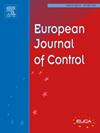Non-linear multi-objective Bayesian MPC of water reservoir systems
IF 2.6
3区 计算机科学
Q2 AUTOMATION & CONTROL SYSTEMS
引用次数: 0
Abstract
Addressing multiple conflicting objectives in online control problems is a challenge. Traditional causal approaches optimize cost functions defined as a weighted sum of cost contributions, each representing a control objective. However, the way cost weights are chosen is traditionally heuristic, based at most on sensitivity analyses. In the literature, some solutions optimize weights based on multi-objective genetic algorithms (NSGA-II). Still, these strategies inherit the well-known deterioration phenomenon in which NSGA-II occurs. Here, we introduce a novel Non-Linear Model Predictive Control (NLMPC) formulation that automatically selects the optimal weight combination, i.e., the one resulting in the best-aggregated performance. We run NLMPC controllers simultaneously at each time step, calibrating their cost function weights using a Bayesian Optimization that optimizes the Pareto frontier’s Hypervolume and Additive Epsilon Indicator. We then select the controller, minimizing the trade-off between objectives. We apply our approach to the Red River system, a highly non-linear and multipurpose water resource system in Vietnam. The proposed tuning algorithm overcomes the literature deterioration issue and validation over six years of observational data shows that our method minimizes the aggregated normalized cost, with and without disturbance knowledge assumption. The back-test of experimental data finally validates our control strategy, demonstrating a dominating solution against historical control.
水库系统非线性多目标贝叶斯MPC
解决在线控制问题中多个相互冲突的目标是一个挑战。传统的因果方法优化成本函数,将其定义为成本贡献的加权和,每个贡献代表一个控制目标。然而,成本权重的选择传统上是启发式的,主要基于敏感性分析。在文献中,一些解决方案基于多目标遗传算法(NSGA-II)优化权重。尽管如此,这些策略继承了NSGA-II发生的众所周知的退化现象。在这里,我们引入了一种新的非线性模型预测控制(NLMPC)公式,该公式自动选择最优权重组合,即产生最佳聚合性能的组合。我们在每个时间步同时运行N个NLMPC控制器,使用优化Pareto边界的Hypervolume和Additive Epsilon指标的贝叶斯优化来校准它们的成本函数权重。然后我们选择控制器,最小化目标之间的权衡。我们将我们的方法应用于红河系统,这是越南一个高度非线性和多用途的水资源系统。提出的调优算法克服了文献退化问题,六年的观测数据验证表明,我们的方法在有或没有干扰知识假设的情况下最小化了总归一化成本。实验数据的回测最终验证了我们的控制策略,证明了对历史控制的支配解决方案。
本文章由计算机程序翻译,如有差异,请以英文原文为准。
求助全文
约1分钟内获得全文
求助全文
来源期刊

European Journal of Control
工程技术-自动化与控制系统
CiteScore
5.80
自引率
5.90%
发文量
131
审稿时长
1 months
期刊介绍:
The European Control Association (EUCA) has among its objectives to promote the development of the discipline. Apart from the European Control Conferences, the European Journal of Control is the Association''s main channel for the dissemination of important contributions in the field.
The aim of the Journal is to publish high quality papers on the theory and practice of control and systems engineering.
The scope of the Journal will be wide and cover all aspects of the discipline including methodologies, techniques and applications.
Research in control and systems engineering is necessary to develop new concepts and tools which enhance our understanding and improve our ability to design and implement high performance control systems. Submitted papers should stress the practical motivations and relevance of their results.
The design and implementation of a successful control system requires the use of a range of techniques:
Modelling
Robustness Analysis
Identification
Optimization
Control Law Design
Numerical analysis
Fault Detection, and so on.
 求助内容:
求助内容: 应助结果提醒方式:
应助结果提醒方式:


